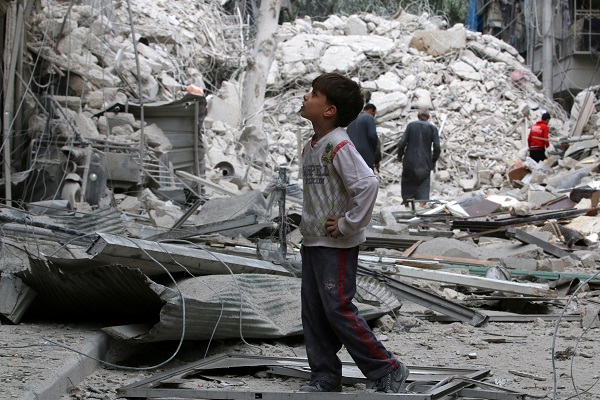
A boy inspects a damaged site after airstrikes on the rebel held Tariq al-Bab neighborhood of Aleppo, Syria. REUTERS/Abdalrhman Ismail

By: Lisa Schlein
Source: VOA News
GENEVA – United Nations agencies have warned that food shortages across Syria are growing as production hit a record low. A joint study by the Food and Agriculture Organization and World Food Program found that five years of civil war was severely limiting the ability of farmers to cultivate their land.
The U.N. agencies have blamed the deteriorating food situation in Syria on widespread insecurity and unfavorable weather conditions in parts of the country. Those factors, they said, “continued to hamper access to land, farming supplies and markets,” making it difficult for farmers to earn a living.
The study, which was based on the latest “Crop and Food Security Assessment Mission,” shows that many farmers, after five years of conflict, have lost their ability to cope. The authors of the study warned that rising prices and lack of fertilizer and seeds might force many farmers to abandon their land unless they receive immediate help.
Were this to happen, they said, it would lead to grave consequences and might ultimately cause further displacement. The United Nations estimates there are at least 6.6 million internally displaced Syrians and nearly 5 million refugees.
“Today, we see almost 80 percent of households across Syria struggling with a lack of food or money to buy food,” said Abdessalam Ould Ahmed, FAO assistant director-general and regional representative, regional office for the Near East and North Africa.
“The situation is only going to become worse if we fail to support farmers so they can maintain their lands and livelihoods,” he warned.
Smallest crop season ever
Field visits and surveys across the country found that 2015-16 was the smallest crop season ever. The report said farmers planted an estimated 900,000 hectares of wheat last year, nearly half the amount planted before the crisis.
Meanwhile, it said production showed an even more drastic decline, from an average 3.4 million tons of wheat harvested before the war began in March 2011 to 1.5 million tons this year – a decrease of 55 percent.
World Food Program spokeswoman Bettina Luescher told VOA the devastating impact of five years of civil war upon Syria’s population was inescapable. “Before this war, Syria was a country that could feed its own people…Now, we have 7 million people who do not quite know where their next meal is coming from.”
The World Food Program feeds more than 4 million people in Syria every month. While this is a substantial number, it does not cover all the people in need. According to the latest household surveys, some 9.4 million people across Syria need assistance.
The joint FAO/WFP assessment shows vast differences among the governorates in terms of access to land. Luescher said the country’s 18 besieged areas were the hardest hit because people were trapped and unable to leave. At the same time, aid could not get in.
“For example, we are extremely concerned about the situation in eastern Aleppo at the moment where the last food rations that have been provided by the U.N. have been given out. It is very hard to say how people will be coping there,” she said.
“Of course, that is a very different situation than in the capital ((Damascus)), where food is readily available on the markets and people can buy things.”
The report collected data in government, opposition and Kurdish-controlled areas; but, Luescher noted there was no data on Islamic State-controlled areas “because they are impossible to reach.”
Impact on livestock
The report also looked at the effects of the civil war on livestock producers. It said ongoing fighting and widespread insecurity continued to limit access to grazing land and water sources, making it ever more difficult and costly to maintain the upkeep of their animals.
“In the past, Syria was an exporter of livestock, of animals,” said the WFP spokeswoman. “Now the herds and flock have shrunk significantly.”
She noted that there were 30 percent fewer cattle, 40 percent fewer sheep and goats, and 60 percent less poultry, which was “the most affordable source of animal protein in the country before this war.”
The report said prices were rising across the board, inflation was going up and the depreciation of the Syrian pound vis-à-vis the American dollar was considerable. “Many herding families are unable to make ends meet and have been forced to sell or slaughter their sheep, goats and poultry,” it said.



